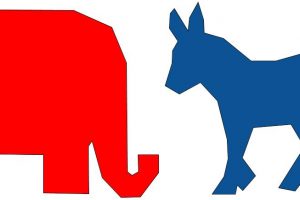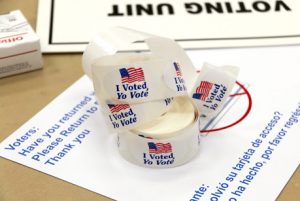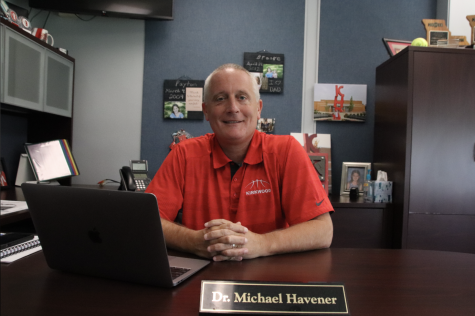Diversity, experience and controversy: A review of President Biden’s cabinet
President Biden’s cabinet consists of Vice President Harris and the heads of the 15 executive departments.
As President-elect Trump began announcing his cabinet picks in 2016, Democrats grew frustrated. They felt Trump’s proposed cabinet was lacking in two areas: diversity and experience. Instead of choosing people who had served in administrative positions related to the department they were to lead, Trump selected CEOs, investors and Wall Street insiders for his crusade to “drain the swamp” of “career politicians.” Instead of choosing people to lead the 15 executive departments who reflected the diversity of the United States, Trump filled 12 of the 15 spots with white men. When President Joe Biden began this same selection process in late 2020, he aimed to do things differently. Biden promised his cabinet would “look like America” and contain officials with experience in the departments they were assigned to run. Now, Biden has made all his selections, choices he believes are indeed marked by diversity and experience, but also containing some controversies of their own.
Diversity:
In stark contrast to Trump’s cabinet, Biden promised to create a “cabinet of firsts.” This started with his nomination of the first Black, first South Asian and first female vice president, Kamala Harris. Since then, Biden has picked the first Black Secretary of Defense, four-star Gen. Lloyd Austin. Xavier Becerra and Alejandro Mayorkas are the first Latinos to head the departments of Health and Human Services and Homeland Security, respectively. Mayorkas’ nomination is even more historic, as the Cuban-born Mayorkas is the first immigrant to run the Department of Homeland Security, a department that deals heavily with immigration policy. In a similar move, Biden has appointed Congresswoman Deb Haaland as Secretary of the Interior. Haaland is a member of the Laguna Pueblo tribe and would be the first Native American to head the department that oversees tribal affairs. For Secretary of Transportation, Biden found another first — his former rival in the Democratic primaries, Pete Buttigieg. The former mayor of South Bend is the first openly gay secretary to run an executive department.
Experience:
In order to fulfill his promise of experience, Biden reached back a few times into the pool of Obama administration officials he worked with as vice president. One of these selections was Secretary of State Antony Blinken, the noted globalist and former Deputy Secretary of State under Obama. Blinken, who speaks French just like America’s first Secretary of State, Thomas Jefferson, will likely look to rebuild the global alliances neglected by the Trump administration. Many of Biden’s picks also have experience dating back to before the Obama administration. Janet Yellen, the first female Secretary of the Treasury, served as the Chair of the Federal Reserve under Obama and the Chair of the Council of Economic Advisors under Bill Clinton. Two other familiar names from the Obama-Biden administration are Jennifer Granholm and Merrick Garland. Granholm, Biden’s pick for Secretary of Energy, worked closely with Biden as the governor of Michigan during the Great Recession to rescue the auto industry. Biden hopes Granholm will be able to promote electric vehicles as secretary. Garland, the proposed Attorney General and former Chief Judge of the United States Court of Appeals for the District of Columbia Circuit, was nominated by Obama to serve on the Supreme Court following the death of Justice Antonin Scalia. However, the confirmation was famously blocked by the Republican-controlled Senate.
The experience of some of Biden’s selections are symbolic as well. Demonstrating Biden’s commitment to unions, for Secretary of Labor he chose Marty Walsh. Walsh, Boston’s mayor, is the former president of Laborer’s Union Local 223. His selection of Miguel Cardona as Education Secretary is a symbolic contrast to Trump’s Betsy DeVos, who had no previous experience in public education. Cardona is a public school parent, former public school principal and former 4th grade teacher. Another one of Biden’s priorities was building a cabinet with officials experienced in weathering the COVID-19 pandemic. An example of such a selection was Rhode Island Governor Gina Raimondo for Secretary of Commerce, a moderate Democrat who managed to reopen schools and businesses with relative safety compared to some neighboring states like Massachusetts.
Controversy:
Biden’s cabinet selections, however, have not occurred without criticism. One of these controversies concerns Gen. Lloyd Austin. Austin needed a congressional waiver before his confirmation because he served as an active-duty officer within the last seven years. After just granting such a waiver to Trump nominee Jim Mattis, members on both sides of the aisle were hesitant to do so again as granting the waiver meant possibly forsaking civilian control of the Pentagon yet again. Nonetheless, the waiver passed the House with only 78 votes against and the Senate with only 27.
Ironically, there are also concerns about diversity and experience in Biden’s potential cabinet. One of these disputes concerns Representative Marcia Fudge, an African-American congresswoman who served on the House Agriculture Committee. Fudge had remarked in an interview with POLITICO that “we’re going to have to stop looking at only certain agencies as those that people like me fit in. It’s always ‘we want to put the Black person in Labor or HUD [Housing and Urban Development].’” Although Fudge’s experience and desires made her appear better suited for Secretary of Agriculture, Biden still chose her as Secretary of Housing and Urban Development. Instead, Biden nominated Tom Vilsack, the former governor of Iowa who has worked in dairy lobbying, for head of the Department of Agriculture. Vilsack is noted for his previous unwillingness to act on climate change and for sometimes supporting corporate agriculture over family farms. Critics of the qualifications of Biden’s cabinet point to his choice for Secretary of Veteran’s Affairs, Dennis McDonough. McDonough is the former Deputy National Security Advisor and Obama’s former Chief of Staff, and although he will preside over Veteran’s Affairs, he is not a veteran.
Confirmation hearings for President Biden’s cabinet began Jan. 19, one day prior to his inauguration. The hearings began with the confirmations of Austin, Blinken, and Yellen.
Your donation will support the student journalists of Kirkwood High School. Your contribution will allow us to purchase equipment and cover our annual website hosting costs.

he/him
Favorite musical artist: The Beatles
Favorite quote:"If men were angels no government would be necessary."- James Madison
Favorite Pantone...

she/her
Favorite musical artist: The 1975
Favorite quote: “Don't bother just to be better than your contemporaries or predecessors. Try to be better...














